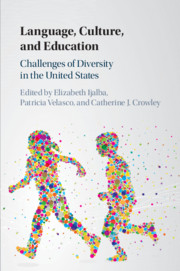Book contents
- Language, Culture, and Education
- Language, Culture, and Education
- Copyright page
- Dedication
- Contents
- Figures
- Tables
- Contributors
- Expanding Language and Ability Difference: A Foreword
- Acknowledgments
- Introduction to the Immigrant Experience
- Part I Immigration, Bilingual Education, Policy, and Educational Planning
- 1 Political, Social, and Educational Challenges in the Struggle to Develop Bilingual Education as a Pedagogical Model in the United States
- 2 Distinguishing a True Disability from “Something Else”: Part I. Current Challenges to Providing Valid, Reliable, and Culturally and Linguistically Appropriate Disability Evaluations
- 3 Distinguishing a True Disability from “Something Else”: Part II. Toward a Model of Culturally and Linguistically Appropriate Speech-Language Disability Evaluations
- Part II Bilingualism, Literacy Ecologies, and Parental Engagement among Immigrant Families
- Part III Cultural Perceptions about Disability, the Home Language, and Healthcare Alternatives among Immigrants
- Epilogue
- References
- Index
1 - Political, Social, and Educational Challenges in the Struggle to Develop Bilingual Education as a Pedagogical Model in the United States
from Part I - Immigration, Bilingual Education, Policy, and Educational Planning
Published online by Cambridge University Press: 11 March 2019
- Language, Culture, and Education
- Language, Culture, and Education
- Copyright page
- Dedication
- Contents
- Figures
- Tables
- Contributors
- Expanding Language and Ability Difference: A Foreword
- Acknowledgments
- Introduction to the Immigrant Experience
- Part I Immigration, Bilingual Education, Policy, and Educational Planning
- 1 Political, Social, and Educational Challenges in the Struggle to Develop Bilingual Education as a Pedagogical Model in the United States
- 2 Distinguishing a True Disability from “Something Else”: Part I. Current Challenges to Providing Valid, Reliable, and Culturally and Linguistically Appropriate Disability Evaluations
- 3 Distinguishing a True Disability from “Something Else”: Part II. Toward a Model of Culturally and Linguistically Appropriate Speech-Language Disability Evaluations
- Part II Bilingualism, Literacy Ecologies, and Parental Engagement among Immigrant Families
- Part III Cultural Perceptions about Disability, the Home Language, and Healthcare Alternatives among Immigrants
- Epilogue
- References
- Index
Summary
- Type
- Chapter
- Information
- Language, Culture, and EducationChallenges of Diversity in the United States, pp. 13 - 30Publisher: Cambridge University PressPrint publication year: 2019
- 1
- Cited by



